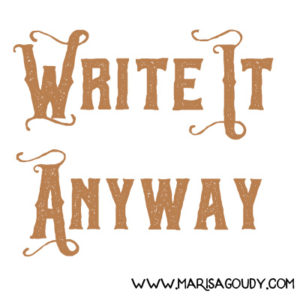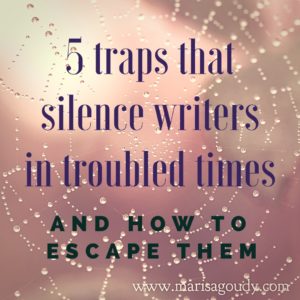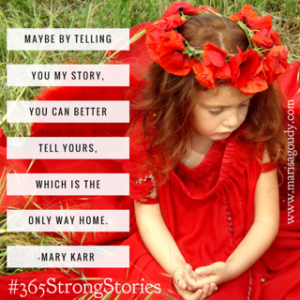
BLOG
How to write what you know when it hurts too much to talk about in public
So much has happened to get you to where you are - so many terrible mistakes and private joys and worrisome truths. There’s an inherent challenge embedded in “write what you know” when what you know is too private or stressful or in-process to share in public.
And, "write from the heart" is a downright punishing statement if you’re a healer or a clinician who helps people solve problems and find peace and happiness when your own daily life is full of conflict and confusion and frustration.
Do you keep a journal?
The Gifts of the Regular Writing Practice for the Person & Professional That You Are
A regular writing practice is good medicine. Writing keeps you going through times of frustration and confusion. When you fall into the rhythm of your own words you can keep fear and loneliness at bay… at least for a little while.
As you make and keep writing dates with yourself, you become stronger. You get to know what you really think and how you really feel.
And, if you’re a lifelong diarist, if you ever need to do research on something like what true love’s first kiss feels like, you have exclusive access to a primary resource. (Or at least I do, but that’s another story!)
If you’re a professional in the transformation business who wants to change some corner of the universe with your ideas, a writing practice helps you become the person who not only thinks brilliant thoughts, but who also changes lives with them.
Your Journal Has Some Secret Gifts to Share with You
As someone who has carried around a journal since shortly after I learned to use a pen, I figured I knew every trick in the blank book of personal writing, but then I met Monica Kenton of the Spiritual Innovation Lab and she revealed a secret that every journal keeper must know:
Use your own journal as a book of answers. When you’re stuck and seeking guidance, ask the greatest authority on your life: yourself. Think about what you need to know and then open your journal to a random page.
Monica shared that idea last month in a workshop at Camp GLP (the most wonderfullest gathering for creatives and entrepreneurs EVER!). I’d forgotten about this magic trick until now. But, as I sit on my front porch, trying to force out a blog post in a few stolen moments while I try to tear myself away from the latest headlines, I realize that I just might have access to exactly what I need to write for you today.
We all break that “write what you know” rule sometimes, and then...
Seeking a taste of my own wisdom, I flip to a random page of an old journal.
Only July 17, 2016 I was up at 5 AM and feeling simultaneously filled up and emptied out by motherhood. Mothers of young children are creatures of the dawn, so I’ve seen the day from this angle countless times, but this wasn’t always the case.
That morning, I scrawled:
In high school, I wrote a story about a world trapped in the eerie half-light of dawn. It was fantasy - and not only because it featured druids and all sorts of enchantment. In truth, I wasn’t all that sure what dawn looked like. Sure, I got up in the dark to catch the bus, but I was too busy putting together my mid-90s flannel ensembles to look out the window.
At sixteen, I was breaking that rule that begs to be broken: write what you know.
Who can blame me? When you’re just desperate for something to happen to you, it seems like all you know are curfews and boys who just don’t get it. It’s almost impossible to write stories when you’re inside them - especially when you think the story you’re living is too limited. As a result, I turned to the completely made up.
Here’s the thing: I think it’s possible to write what you know even if your story is full of unicorns and dragons (even if you haven’t seen one - yet.).
If that story the sixteen year-old me was actually about yearning to be kissed by "the one" and a teenager’s longing for freedom, the silver horned creatures and the weird atmospheric conditions would have been completely believable and wonderful.
Thing is, I wasn’t writing a truthful story because I wasn’t willing to live the part of it that was completely accessible every damn morning.
You wander into “fraud” territory when you write about a daily planetary event and don’t actually bother to go looking at it.
You’re out of step with authenticity when you ignore that you and your life have a part to play in the stories you tell.
Apply the “write what you know” advice in a way that supports your life and writing process
But we're not kids anymore.
So much has happened to get you to where you are - so many terrible mistakes and private joys and worrisome truths. There’s an inherent challenge embedded in “write what you know” when what you know is too private or stressful or in-process to share in public.
And, "write from the heart" is a downright punishing statement if you’re a healer or a clinician who helps people solve problems and find peace and happiness when your own daily life is full of conflict and confusion and frustration.
But what DO you write about when life is hellish and your brand is meant to offer clients hope and solace?
The sunrise.
I’m taking this 2016 journal entry literally. If you can’t write about what’s happening in daily life, you must be able to write about what it means to stand in the stillness of dawn and tune into something bigger than your dramas.
Here’s your writing prompt:
Watch the sunrise. Why would your perfect reader/ ideal client/ the individual who needs the change you seek to be in the world benefit from experiencing the stillness of dawn?
Give yourself permission to see that sunrise through the shadows that cloud your vision, through the hopes that blur your sight, through your biases that create your perspective
Even if every writer in this community wrote their next blog post about a sunrise, we’d all write something unique and show up as OURSELVES in the page. We’d offer some specific medicine that would help our own communities of clients see themselves more clearly and heal their lives.
You're invited to show up for the display nature puts on for free every day and turn that into your own story
I invite you to get up early tomorrow. Make a cup of something hot and strong. Get yourself to a window or snuggle into your coziest robe and face east. Then, go write. Please share the link in the comments or tag me in social media so I can see this particular sunset through your eyes and the eyes of the people you're writing for.
Want more writing prompts like this one? Join the next free community writing practice call.
15 Stories that Will Help You Find Your Way Through the Holidays
 It’s the Tuesday before Thanksgiving and the sun has some climbing to do before it reaches the horizon. The house quakes in the wind and I’m unaccountably sad that there are trucks collecting garbage in the freezing darkness of rural New York November. Somehow it seems tragic and strange that we live in a world that doesn’t have enough daylight hours to deal with its trash.
Perhaps my cozy, privileged little bout of worry is forcing story into the hands of those hardened waste collection warriors.
It’s the Tuesday before Thanksgiving and the sun has some climbing to do before it reaches the horizon. The house quakes in the wind and I’m unaccountably sad that there are trucks collecting garbage in the freezing darkness of rural New York November. Somehow it seems tragic and strange that we live in a world that doesn’t have enough daylight hours to deal with its trash.
Perhaps my cozy, privileged little bout of worry is forcing story into the hands of those hardened waste collection warriors.
It’s just a paycheck, lady, they might say. You keep to your words and those gigantic cups of tea, and we’ll work at the edges of the day to keep the world running smooth enough for the storytellers and the dreamers and mothers and all the rest who create pretty things for a living. After all, someone has to keep clearing away the scraps to reveal all that beauty you’re looking for.
Stories always find a way. Stories help us find the way.
That. That right there. That little paragraph is proof that there are stories waiting to be revealed in every conversation - real or imagined. Stories lurk in every moment of reflection. Stories even hide in the noisy blackness of a Hudson Valley back road at six AM.
Stories guide us toward the dawn. Stories anchor our worries and our blessings so they become real enough to be spoken aloud.
I didn’t wake up this early to fret over America’s waste problem or its labor practices, though both would be worthy preoccupations in their own time. I’m at my desk because I’m sleepless with stories and gratitude.
I’m here to offer 15 tiny gifts that are all more enduring than the latest soul shaking headline or the worries that race through your mind.
Each story you read, each story you write: it’s a gift.
Early in 2016, 15 writers answered a call.
Fifteen writers joined me for my frightfully ambitious #365StrongStories project. Each contributed a story - of birthing, of dying, of living in spite of all the pain that these simple events bring forth.
With their contributions, each writer lightened the burden of a daily writing project that ended up demanding too much from me. After well over one hundred posts, in May I abandoned my promise to tell a story each day. My life wasn’t designed to produce and publish a story 365 times in a row. I’m not sure that anyone who is dedicated to tending and protecting her creative source would want to force herself into such an arrangement.
But the writers who joined me were doing so much more than helping an overcommitted #365project sister out. Each story was a gift: for me, for the readers, and for the writer who gave herself permission to lavish attention on her own tale.
It’s not to be taken lightly, this work of shaping ideas into something that has a beginning, middle, and end. Turning twenty-six letters into a code we can all understand and then deftly splicing and slicing the words in their own divinely inspired order so that they make a story… that’s alchemy. And alchemy is transformational magic.
[tweetthis]This work of shaping ideas into something with a beginning, middle & end is not to be taken lightly[/tweetthis]
15 short story shaped gifts for you & yours this Thanksgiving
And so, now that the sky is brightening and it’s time to launch my girls into one more school day before the Thanksgiving break, I want to take a moment to thank each writer and to offer their stories to you as the gifts that they are.
Before the family arrives, before you’re up to your elbows in stuffing and sage, and before you have that next glass of wine, read a few of these stories.
May they offer comfort. May they offer inspiration. May they remind you of what you have lost and what you still might find.
Meet the #365StrongStories guest storytellers
Read Doubt and Annie D. by Suzi Banks Baum when you’re rumbling with creativity, self-doubt, and missing your babies.
Read Knowing Motherhood by Barb Buckner Suárez when you’re struggling to find your own voice while still honoring those who taught you to speak.
Read Echo Grandma by Evelyn Asher if you’re separated from your loved ones and are seeking creative ways to connect.
Read When Elder Becomes Child by Tania Pryputniewicz if you’re carrying a parent as you hold tight to stories of the way life used to be.
Read The Woman and Her Irishman by Brenna Layne if you have an ancestral mystery to solve.
Read Traveling Distances by Peggy Acott when you’re journeying to a meal you’re never going to forget.
Read Luis: A Study in Breath by Liz Hibala because we share this holiday with our animal companions too.
Read As I Remember It by Ginny Taylor because the past is often full of pain and survival and we need to honor those memories.
Read The Inconvenient Allure of Solitude by Maia Macek if you just want to slip away from the table to be blissfully alone.
Read Dance Camp by Sara Eisenberg because you need to experience your body through movement, not through overeating.
Read Walking Home by Dawn Montefusco because you need to root into your core beliefs… especially when certain members of the family start talking politics.
Read Stand Here by Stan Stewart if someone in your family is struggling with addiction.
Read The Martyrville Messenger by Lois Kelly if a loved one’s illness keeps you close to home this year.
Read Up the Mountain by Sharon Rosen to dive into the sensations of the body and savor the blissful and the brutal.
Read Never Evens by Kelsey Rakes to prepare yourself for the unexpected - especially if you’re expecting.
Are you ready to tell your own authentic, compelling stories? Learn how the Story Triangle can transform your writing and your practice.
Stop asking your writing to be original. Ask it to be meaningful.
What do I have to say about how to live a good life that hasn't been shared or said a million times before?
Jonathan Fields asks this question in the introduction to his brand new book How to Live a Good Life.
I know you've asked yourself the same thing. My clients wonder - and worry - about this all the time. I know I've wasted too much delicious writing time stressing about whether the world needs my words.
Truth is, whatever it is, it's almost definitely been said before.
You probably don't need proof on this one, but here it is. I had written most of this post before I picked up Jonathan's book and saw my own concerns reflected back at me. But, he wrote on and trusted his voice. Since that's what I invite people to do every day and since I do try to take my own advice, I'm publishing this anyway.
A loving reminder for you, the writer who is afraid to dive into a big topic because the luminaries in your field have already written brilliant books on the subject:
 WRITE IT ANYWAY
WRITE IT ANYWAY
The big names... they're fulfilling their mission to awaken and inspire the multitudes. The rest of us - the brilliant "not yet household names" and the beautiful "don't care to ever be household names" - right now, our mission is to make those messages REAL for people.
A reader may be ready to change everything thanks to Love Warrior, but all Glennon can do is inspire from afar. Daring Greatly may crack a vulnerable heart wide open, but Brene isn't a clinician, she's a researcher. Jonathan charges $1000/hour for consulting, and while I believe that's a completely worthy investment for certain people, there's a lot of vital, sustainable work to do at the $100/hour level too.
You're in the transformation business, not the originality business
The desire to transform, to be happy, to lead meaningful lives? These are timeless human needs. Wise people have been trying to crack the good life code and help others do the same from the very beginning. (Honestly, listen to Rob Bell's series about the Wisdom tradition and prepare to be amazed at how ideas presented in the ancient Hebrew feel utterly contemporary.)
Yes, all the truth tellers in the world of transformation, healing, and consciousness are essentially talking about similar things. That happens when people start discussing what's true and what's real.
As a healer, a therapist, or a coach it's part of your job to take the stuff "everybody" talks about and make theses truths your own. And, it's your job to help people own these truths.
You dive in and connect these big, ubiquitous concepts to your own stories. You bring the essence of who you are to the page. You don't speak to everyone, you speak to the ones who you wish to serve.
And then you put your work on your blog or in elsewhere in your marketing because you know people who are seeking and hurting need your perspective - and your help.
That's how you show your potential clients that you get it, that you get them. That's how you build a business and change your corner of the world.
It's not about being the first and only creature to share an idea. It's about speaking the right words in the right tone to the people who have access to you and your transformational magic.
It's about making meaning and building a connection with the people who matter.
Write it anyway. Write it now. Click the button for a printable PDF that will remind you to make it happen.
The 5 Traps that Silence Writers In Troubled Times (And How to Escape Them)
 Every time I see a well-considered, from-the-heart blog post that seems to further a writer’s personal and professional mission, I’m impressed. When I see such a piece during the summer of 2016, I’m in awe.
There are so many forces that conspire to silence us and get us to put off this week’s blog post, video, or newsletter. Some are external forces that are rocking the nation and the world. Some of the troubles that silence you are more internal affairs.
Every time I see a well-considered, from-the-heart blog post that seems to further a writer’s personal and professional mission, I’m impressed. When I see such a piece during the summer of 2016, I’m in awe.
There are so many forces that conspire to silence us and get us to put off this week’s blog post, video, or newsletter. Some are external forces that are rocking the nation and the world. Some of the troubles that silence you are more internal affairs.
All end up being deeply personal because these are the forces that influence the way you understand and craft your stories and how you share them with your readers and clients.
Yes, we need periods of silence and introspection to process difficult events and develop a truth-filled response rather than a knee jerk reaction. But we can’t stay in analysis paralysis.
As a professional in the transformation business, it’s part of your job to create content that speak to the worries and preoccupations of the day. It’s not about taking sides, It’s about considering what your ideal readers might be thinking and offering the healing and the insights that help them make sense of collective and personal struggles.
[tweetthis]In the transformation business? It’s your job to write content that speaks to the events of the day[/tweetthis]
And, your transformation work also includes staring your own demons in the face so you can show up to share your unique medicine with your ideal clients and readers.
So, what’s keeping you from sharing your stories and ideas?
The 5 Traps that Silence Writers
The passage from silence to speaking and sharing your truth begins with understanding. Let's take a moment to look within and figure out what’s causing the words to catch in your throat. Once you know the “why” behind your publishing slump you’ll be freed to take the steps toward healing, writing, and sharing.
Trap # 1: You’re concerned that there’s so much tragedy out there, and you have nothing to helpful to contribute
“There are no words” and “my heart is too heavy” are common statements in the summer of 2016 when we’ve watched violence erupt across America and across the world. These are perfectly human, worthy responses to Stanford, Orlando, Falcon Heights, Dallas, Baton Rouge, Nice, and other healdines.
 When the shock has worn off, can you see it as part of your work to add light to the collective darkness? Whether it’s in alignment with your message to say “illegitimi non carborundum” or offer prayers or write an impassioned response to the injustices that you see before you, when you have a community built around your ideas and services, you do have something meaningful to say.
When the shock has worn off, can you see it as part of your work to add light to the collective darkness? Whether it’s in alignment with your message to say “illegitimi non carborundum” or offer prayers or write an impassioned response to the injustices that you see before you, when you have a community built around your ideas and services, you do have something meaningful to say.
The people who trust you and your work will be grateful that you’re helping make sense of this senseless season of strife.
[tweetthis]Keep writing. Your readers will be grateful you’re making sense of this senseless season of strife[/tweetthis]
Trap #2: It feels wrong to do business as usual when so many people are suffering
In this spirit of full disclosure, this is the misconception that has silenced me for most of the summer. I couldn’t even write into the idea directly (hence this more broadly focused post!).
Thank goodness for my digital community of wise entrepreneurs and writers. With deep gratitude, I share Carrie Klassen of Pink Elephant’s brilliant response: How can we talk about our businesses when the world's on fire?
Yes, we can talk about business even when the news feeds are full of sorrow and anger and fear. In fact, as healers and world changers, we must.
Trap #3: You’re listening to the inner critic’s whispers of “not good enough”
Regardless of the state of the world, this is a perennial problem for so many of us. What can you do about that critical voice? Write more.
Yes, it’s for all the reasons you might expect. Practice will make you a more clear, efficient, effective, and engaging writer who knows herself and her readers.
But, there’s another reason.
When you commit to a regular writing practice (can you imagine writing two, three, or more times per week?) you become stronger than your inner critic. She’ll be huffing and puffing with her head between her knees while you’re conquering the next blog post with confidence and grace.
Trap #4: You’ve decided that it’s too noisy online and there are too many content creators competing to be seen
When you decide that the blogosphere or podcast ranks or Amazon top sellers lists are too saturated that doesn’t mean you’re being realistic. It means you’re letting fear take over.
Worrying over the audience that will not show up is just another manifestation of your doubt and not-good-enoughitis.
 So, if you are the sort of writer who can drop into the flow of ideas but never gets the beyond the first draft journaling stage or if you’re someone who rarely writes at all because “no one is listening,” consider this:
So, if you are the sort of writer who can drop into the flow of ideas but never gets the beyond the first draft journaling stage or if you’re someone who rarely writes at all because “no one is listening,” consider this:
The world - or, more specifically, your circle of ideal readers - they do need to hear from you! They need your insights, your solutions, and the magic and the medicine that only you can serve up.
Every big time author and internet famous thought leader started somewhere… they started with the belief that there are people who needed their help and their stories.
Trap # 5: There’s too much going on in your own life right now and the stories are all too in-process
Ok, so maybe there are two big reasons that I find it hard to get into the public writing flow.
Summertime is always complicated for a mother of young children, Add in those trips to the lawyer’s office and the endless charity deliveries that are part of selling my mother-in-law’s house and preparing for her to move in with us… I need to ask you, dear reader, to read between the lines and understand that many of my stories from the home front are pretty raw and unfit to print.
Be gentle with yourself when you’re living the story and trust that there will be time to write it… eventually.
If you’re in the messy middle of something and don’t dare to tell the stories you, check out these past posts:
For the “just get it done, lovie!” perspective, try this post.
If you’re in the sort of mood where a phrase like “If you stick around your professional online haunts even when you feel like an emotionally crippled zombie, you risk your sanity - and potentially your reputation” appeals to you, try this one.
The remedy is in the stories
When everything is beautiful, we need to tell and receive stories. When everything feels like it’s going to hell, we really need to share our stories.
[tweetthis]When everything is beautiful, we need stories. When life is hell, that's twice as true. #writing[/tweetthis]
Need help unlocking your stories? Wishing you had a concrete reason to quit planning to blog and actually start writing for the readers that need your unique message? Check out the You, Your Stories, and Your Audience course. There's a summer deal running between now and Labor Day and I would love you to save some money and get writing while the sun is still shining high in the sky!
This is why your audience missed your best story
 In a third floor loft with giant skylights opening on the fading summer dusk, two small children closed their eyes and fell asleep.
This isn’t much of a story until you understand that it’s Independence Day on Cape Cod at a condo just a few blocks from the beach.
In a third floor loft with giant skylights opening on the fading summer dusk, two small children closed their eyes and fell asleep.
This isn’t much of a story until you understand that it’s Independence Day on Cape Cod at a condo just a few blocks from the beach.
The mother watches the glow of fireworks on her children’s slack cheeks before she slips into her own oblivion. There are families saying “ooooh!” and “ahhhh!” all across the neighborhood, but the booms and cracks are just a lullaby to everyone at 19 Grove Lane.
This two year-old and this six year-old have come to their grandparents' house to be stuffed with marshmallows and wrapped in red, white, and blue dresses. This is the week when bedtime is a fairytale and adults hurry kids to get to the beach to catch the tide, not to get out the door to catch the bus. We are a family who believes in much of the patriotic excess of July 4.
But just not this year.
That word might not mean what you think it means - at least not to everyone
Vacation only has 8 letters, but it has a billion different meanings. For some, it’s hammocks and lemonade. For others, it’s mouse ears and princesses. For some it's hanging off a cliff or shooting down the rapids.
Then there are those who use the word to describe packing up the kids and throwing them into a house with a bunch of people who share the same gene pool but enjoy vastly different daily lives. We then add in some sand, salt, sugar, and pour adult beverages on top of it all and V-A-C-A-T-I-O-N spells emotional and physical marathon full of the joys of victory and the agony of defeat.
Vacation looks a lot more like survival (another 8 letter word) than relaxation.
In our case, July Fourth fell on the fifth day of our holiday and we were too worn out to care about sparklers or bonfires or the rockets red glare.
It’s Not Your Fault Your Audience Couldn’t Tune Into Your Story
If my kids and I could drift off during a huge fireworks display set off a few thousand feet from our beds, your ideal readers could definitely miss your blog post. Heck, your audience may well miss the fact that you’re blogging or podcasting or newslettering at all!
We live in a world of distraction. We live in a world of too much stimulation and too little human stamina to take it in - even when it’s wonderful, even when we said we were coming to town just to experience it, even when it’s part of being happy enough 21st century Americans who hold out some hope that Washington will look like Jed Bartlet’s city some day.
Yes, it might occasionally be you, the storyteller, who needs to shift the story to meet the needs and interests of the audience.
But it’s likely that you’re telling a splendid tale and pitching it at just the right people but they’re just too full or too tired or too preoccupied to absorb it.
So what do you do?
You can always try again next year when everyone is a little older and wiser, but the good news is that you probably don’t have to wait 365 days to try to put on the show again.
If you’ve got a story that you believe in, keep nudging it into the world. Not with pyrotechnics that wake the neighbors. Not in some annoying, spammy “read my post, dear Facebook group I never participate in unless it’s for self-promo!” sort of way.
Share it in a way that feels like an invitation to learn or enjoy something really meaningful.
Remember that a lack of response isn’t necessarily a judgement on the quality of your story. It’s timing. It’s overstimulation. It’s proof that we’re all just fragile humans trying to balance FOMO (that's "fear of missing out") and a wee bit of self-care.
Do you have a story that you're really proud of that your ideal readers missed out on? Leave a link in the comments below and I'll do my best to share it with my community.



